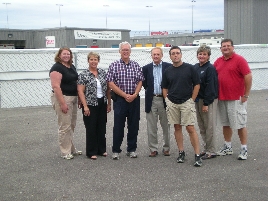|
Who are
Entrepreneurs? Why Do We Need Them?
 Entrepreneurs
are innovators who assume the risk of organizing and operating a
business or non-profit venture. Entrepreneurs question the status
quo; they recognize opportunities for addressing needs, problems and
wants that others may not see. They are the backbone of every
community’s economy. It is estimated that 44 percent of
new jobs in the U.S. are generated by startup firms with only a few
employees. These firms create about 70/% of new economic
growth in the nation. Entrepreneurs
are innovators who assume the risk of organizing and operating a
business or non-profit venture. Entrepreneurs question the status
quo; they recognize opportunities for addressing needs, problems and
wants that others may not see. They are the backbone of every
community’s economy. It is estimated that 44 percent of
new jobs in the U.S. are generated by startup firms with only a few
employees. These firms create about 70/% of new economic
growth in the nation.
Small
business income in Kentucky approached $8 billion in 2003.
These small firms employed 50.3% of the state’s non-farm private
workforce. As the Small Business Administration noted we are
moving into an “entrepreneurial age.” If current trends
continue it has been estimated that one out of every four rural
citizens will be self-employed by 2015.
Entrepreneurs add to the quality of local life through improved
goods and services. They generate new income for themselves
and others and tend to be loyal to the communities in which they
start their firms. They often become civic leaders and donate
services and money to their community.
These
are some of the reasons why Kentucky communities may be shifting
their economic development resources from an exclusive focus on
industrial recruitment to a more balanced portfolio to create more
entrepreneurs, build better skilled entrepreneurs and more
competitive and productive small businesses. Communities
can strengthen their entrepreneurial culture and behavior.
Why Is
An Entrepreneurial Culture Important?
A 2003
Kentucky Entrepreneurial Coaches Institute study assessed the state
of entrepreneurship in Northeastern Kentucky. While it
recognized the strength of support services for entrepreneurs, it
found there was limited local support and recognition of the
importance of entrepreneurs in the local economy.
Think
of your community as an entrepreneurial venture. Entrepreneurs
are innovators who transform ideas into something that people value
or need. Entrepreneurial-friendly communities appeal to
creative individuals. They nurture creativity through the
arts, honor diversity, promote a healthy civic life and celebrate
their cultural uniqueness. A strong entrepreneurial culture
provides a setting in which an entrepreneur is more likely to emerge
and stay. Entrepreneurial friendly settings take a systems
approach to entrepreneurship; they connect the dots. They link
entrepreneurs with investors, technical assistance provides and
others. They integrate entrepreneurship into youth education,
leadership development, faith life, philanthropy and other aspects
of community life. An entrepreneurial friendly community has
entrepreneurial leaders, advocates and coaches who make it easier
for small businesses to start and succeed. |

KECI
Fellows Todd Hoskins and Anita Skaggs (Casey County)
meet with entrepreneurs from Kenny's Country Cheese
(Barren County) during An Entrepreneurial Taste of
Bowling Green Event held at the National Corvette
Museum in Spring 2008. |
.jpg)
Ron Hustedde, KECI Director, and Katie Ellis, KECI
Program Coordinator, work to highlight
entrepreneurship throughout South Central Kentucky
during An Entrepreneurial Taste of Bowling Green
Event held at the National Corvette Museum in Spring
2008. |
.jpg)
Karen
Dabson, RUPRI Center for Rural Entrepreneurship,
talks to KECI Fellows during the Energizing
Entrepreneurs seminar. |
|
|
Entrepreneurial Success Stories

KECI Fellows and Team
Members visit with the Iowa Speedway and learn how an
entrepreneurial vision made this dream a reality. |
“We must give more in order to get more. It is the generous
giving of ourselves that produces the generous harvest.” Orison
Swett Marden
Newton, Iowa
made national headlines in 2005 when the community’s largest
employer, the Maytag Corporation, announced its intent to sell
the company. This is a story that rural communities in Kentucky
have known all too well in recent years. During the months
following the announcement the community found itself at a
crossroads. They could accept this reality and begin to work
proactively to create new opportunities for a highly-skilled
workforce or they could toss their hands in the air and embrace
a why me attitude and wait for the silver lining. Out of
necessity, several individuals in the community rose to the
challenge.
One such
individual was Jordan Bruntz, of Springboard Engineering. Bruntz
is a former Maytag laundry R&D team leader who worked with a
team of highly-skilled individuals who remained dedicated to the
Newton community in the wake of this transitional period. “The
conditions to start a business were perfect. It was the perfect
storm and we had nothing to lose,” recalled Bruntz who
approached several of his team members about branching out and
opening their own business during the transitional period after
Maytag’s announcement. Through this decision to create
Springboard Engineering, the quest for funding, establishment of
the company, and its continued growth, Bruntz has remained true
to the values instilled in him at an early age, growing up on
his family’s dairy farm. From his experience on the farm Bruntz
learned the value of hard work and the joy that comes with such
efforts, that nothing goes to wasted and that he has a
responsibility to take care of his family and friends. These
three themes continue to guide Bruntz and his work with
Springboard. For him, entrepreneurship is about much more than
financial gain. Entrepreneurship is about taking care of the
people around him.
Chris Barton, a young entrepreneur in Newton, has also come to
embody this way of life. “An entrepreneur is anybody that is
willing to do what it takes. I come up with ideas and I’m going
to do what it takes and not let up,” emphasized young
entrepreneur Chris Barton of Newton, Iowa. “I’m not doing this
to make money. I’m doing this because I love it,” said Barton
who has embraced and begun to the live the philosophies of
competitive advantage, creativity, risk, and care for the people
around him well before the age of 35. He has a keen
understanding of the assets that exist within his community and
ways that he can tap into and serve global markets.
Another example of care for the people in the community and
entrepreneurship roots is seen in that of Maytag Dairy Farms.
The farm was started in 1919 in the community had has evolved to
be a worldwide competitor in the cheese industry. They are
best-known for their blue cheese which has been recognized by US
Presidents. Maytag Dairy has remained true to his roots and has
chosen not to automate the process. Instead, each wedge of
cheese is handled with care by members of the community. This is
Maytag Dairy Farms competitive advantage.
These are merely a few shining examples of the innovation that
exists within the Newton community that the South Central
Kentucky KECI Fellows saw during their E-Communities Tour of
Iowa. Throughout the past five years this community has seen and
embraced more change than many do in a decade. This change has
not come easily or; rather, it has evolved out of necessity.
However, many powerful lessons are to be learned from this
experience. As community leaders we must question what it will
take for our communities to become more entrepreneurial-friendly
and continue to strive to create environments in which
entrepreneurs thrive. After all, isn’t it the people that matter
in the end? The Newton community would argue so. |